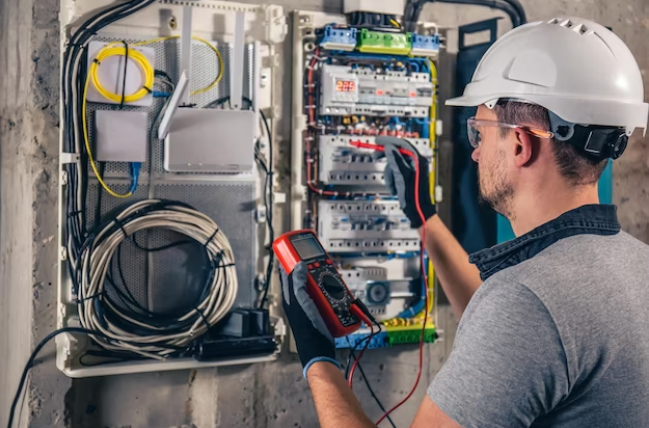As a homeowner, it’s important to ensure the safety and functionality of your electrical system. One way to do this is by scheduling a wiring inspection.
But how do you know when it’s time for one?
There are several signs that indicate your home may need a wiring inspection. By being aware of these signs, you can ensure the safety of your home and prevent potential electrical hazards.
In this article, we’ll explore seven ways to know when your home needs a wiring inspection.
Flickering Lights
Flickering lights are a common sign of faulty wiring in a building. If you notice your lights flickering frequently, it’s important to investigate the issue immediately. Other signs of flickering lights may include dimming or brightening, buzzing sounds, and hot or discolored switch plates. Possible causes of flickering lights include loose connections, outdated wiring, overloaded circuits, or a faulty fixture. Wiring problems can pose a serious risk of electrocution or fire, so it’s crucial to address the issue as soon as possible.
A licensed electrician can pinpoint the problem and provide a safe and effective solution.
Electrical Shocks
Faulty wiring in homes can be extremely dangerous and can lead to electrical shocks, which can cause serious injury or even death. Signs of faulty wiring include flickering lights, frequently tripped circuit breakers, burning smells, and buzzing sounds.
According to the National Fire Protection Association (NFPA), electrical failures or malfunctions were the second leading cause of U.S. home fires between 2012-2016.
In addition, electrical distribution or lighting equipment was involved in 44% of home fires caused by electrical issues during that same time period. It is important to have a licensed electrician inspect your home’s wiring if you suspect any issues.
This can help prevent dangerous electrical shocks and potential fires.
Burning Smell
Faulty wiring at home can be a serious safety hazard. One of the most obvious signs of faulty wiring is a burning smell. If you notice a burning smell, it could mean that the insulation on the wires is melting or that there is an electrical short circuit.
The smell of burning faulty wiring can vary depending on the type of material that is burning. Some common smells associated with burning wiring include:
- burning plastic or rubber smell
- metallic smell,
- fishy smell, and
- the smell of a rotten egg or sulfuric.
It’s important to note that if you detect any of these smells in your home, you should immediately turn off the power source and contact a licensed electrician to inspect and repair the wiring. Ignoring the issue can lead to potential fires or electrocution hazards.
Tripping Breakers
Tripping breakers can occur due to various reasons such as overloading, short circuits, ground faults, and aging equipment. To prevent it from causing faulty wiring, it is important to properly size electrical circuits and not overload them with too many appliances. Regular inspections and maintenance of electrical equipment can also help identify and prevent potential hazards.
Installation of ground fault circuit interrupters (GFCIs) and arc fault circuit interrupters (AFCIs) can provide added protection against electrical hazards.
Another solution is to upgrade the circuit breaker to one with a higher amperage rating. It is also important to ensure that the wiring and connections in the circuit are in good condition and not damaged or loose. If the issue persists, it may be necessary to consult an electrician to identify and resolve the underlying problem.
Outdated Wiring System
Some signs of an outdated wiring system include: frequently blown fuses or tripped circuit breakers, and buzzing or sizzling sounds coming from outlets or switches.
Inspecting an outdated wiring system is crucial in preventing faulty wiring.
Here are some steps to follow:
- Start by turning off the power supply to the wiring system you want to inspect.
- Look for any visible signs of damage such as frayed wires, burned spots, or melted insulation.
- Check for any loose connections, especially at the electrical outlets or switches.
- If you notice any outdated wiring materials such as aluminum or knob-and-tube wiring, consider upgrading to modern wiring materials.
- Hire a licensed electrician to perform a more thorough inspection and make any necessary repairs or upgrades.
Old wires may be frayed, cracked, or damaged, increasing the likelihood of sparking and overheating. They may also lack the capacity to handle modern electrical demands, leading to circuit overloads and power outages.
Outdated wiring may not meet current safety codes and standards, putting you and your family at risk.
Rewiring for Home Renovation
Home renovation is an exciting but challenging task. One important aspect to consider during the process is rewiring. Rewiring involves replacing old, outdated or damaged electrical wiring with new wires. It is essential for safety reasons and to ensure the electrical system can handle modern appliances and technology.
During the rewiring process, the electrician will install new wiring, outlets, and switches, and ensure that the electrical system is up to code. This will not only increase the safety of the home but also improve energy efficiency and reduce the risk of electrical fires.
It is important to plan ahead and budget for rewiring during a home renovation project. While it may seem like an added expense, it is a necessary investment in the safety and functionality of the home. With proper rewiring, homeowners can enjoy their newly renovated space with peace of mind.
Do not DIY your wiring!
DIYing your wiring can be a risky idea for several reasons.
1. Electrical work can be complex and dangerous, especially if you lack training and experience. Accidental electrocution, electrical fires, and property damage are just some of the potential hazards.
2. Shoddy wiring can result in code violations and failed inspections, which can lead to costly repairs and legal consequences.
3. If you plan to sell your property, improperly installed electrical systems can decrease its value and make it harder to find a buyer. For these reasons, it is often best to hire a licensed and experienced electrician for any electrical work you need in your home or business.
A licensed electrician in your area can inspect your wiring and identify any potential hazards, as well as provide recommendations for upgrades or repairs. Don’t wait until it’s too late.
Your safety and the safety of those around you are too important. If you are in the Auburn WA area, Check this out for more information.




